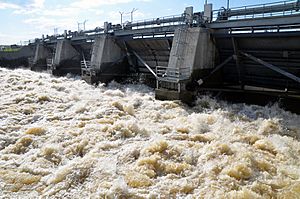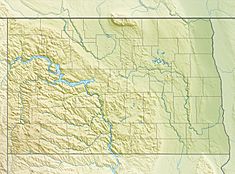Lake Darling Dam facts for kids
Quick facts for kids Lake Darling Dam |
|
|---|---|

Lake Darling Dam releases 22,000 cubic feet per second (620 m3/s) on June 27 during 2011 Souris River flood.
|
|
|
Location of Lake Darling Dam in North Dakota
|
|
| Country | United States |
| Location | Ward County, northwest of Minot |
| Coordinates | 48°27′27″N 101°35′00″W / 48.45750°N 101.58333°W |
| Status | Operational |
| Opening date | 1936 |
| Owner(s) | United States Fish and Wildlife Service |
| Dam and spillways | |
| Type of dam | Embankment, earthen |
| Impounds | Souris River |
| Height | 39 ft (12 m) |
| Length | 3,300 ft (1,006 m) |
| Reservoir | |
| Creates | Lake Darling |
| Total capacity | 110,000 acre⋅ft (135,683,002 m3) |
| Catchment area | 9,450 sq mi (24,500 km2) |
| Surface area | 15.6 sq mi (40 km2) |
| Maximum water depth | 26 ft (8 m) |
The Lake Darling Dam is a special kind of wall built across the Souris River in North Dakota. It's located about 20 mi (32 km) northwest of a city called Minot, in Ward County. This dam helps control water and save it for later use.
Construction of the dam finished in July 1936, and it started holding water in April of that year. It's an important part of the Upper Souris National Wildlife Refuge, which is a protected area for animals and plants. The United States Fish and Wildlife Service owns and manages the dam. The dam and the lake it creates, called Lake Darling, are named after Jay N. "Ding" Darling. He was the very first director of a government agency called the Bureau of Biological Survey. Even though the dam is in Ward County, most of Lake Darling is actually in Renville County, which is just north of Ward County.
How the Dam Works
The Lake Darling Dam is an earthen embankment dam. This means it's built mostly from packed earth and rock, like a big, strong hill. It's designed to hold back the river's water, creating Lake Darling. This lake stores water for many reasons, including helping wildlife and managing water levels.
Who Manages the Dam?
Normally, the United States Fish and Wildlife Service is in charge of running the Lake Darling Dam. They make sure it works properly for water conservation and the wildlife refuge. However, things change when there's a lot of rain or melting snow.
During times of heavy flooding, the control of the dam is given to the U.S. Army Corps of Engineers. This is a special group of engineers from the U.S. Army who are experts at managing water and preventing floods. They take over based on an agreement made in 1989.
The 2011 Flood
One important event for the dam was the 2011 Souris River flood. During this flood, Lake Darling, the reservoir behind the dam, became very full. To prevent too much water from building up, the dam had to release a lot of water.
In early June 2011, the dam was releasing about 7,500 cu ft/s (210 m3/s) of water. This large release added to the flooding downstream, meaning areas further along the river. By June 26, the amount of water being released increased even more, reaching 24,000 cu ft/s (680 m3/s). After this peak, the amount of water released was slowly reduced. This shows how important the dam is for managing river levels, especially during big floods.
 | William Lucy |
 | Charles Hayes |
 | Cleveland Robinson |


